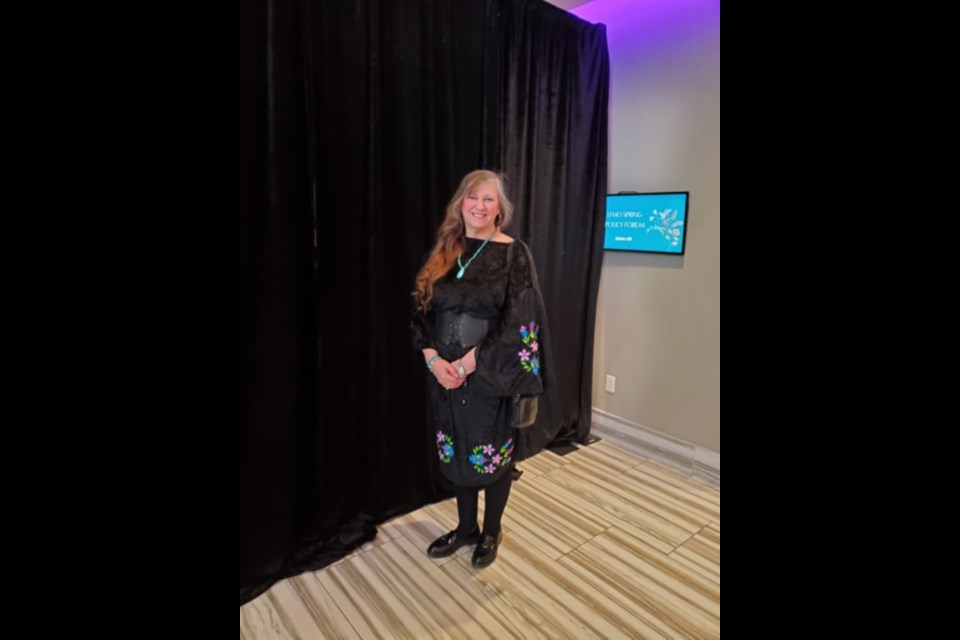LAKELAND - Annette Ozirny-Hobart has been awarded a King Charles Coronation Medal for the work she has done as an Indigenous advocate, consult, and community member.
She was chosen for the award by the Women of the Métis Nation - Le Femmes Michif Otipemisiwak, and travelled to Ottawa to accept her medal.
Ozirny-Hobart works as a regional engagement specialist for the Alberta Energy Regulator (AER) but has worked and volunteered across a broad range of sectors and organizations. The common theme that arises from her journey is that Ozirny-Hobart identifies where there should be a seat at the table for an Indigenous perspective and fills the seat herself or shows others how to navigate it.
“If I see that there is a place where there's not an Indigenous person at the table, I take it upon myself and insert myself, hence why I volunteer so much. I want to be that voice. My desire is to leave big footprints for others to follow so the journey is not quite as hard as the one that I've had,” said Ozirny-Hobart.
Melanie Omeniho, President of the Métis Women of Canada, presented the medal, and spoke about Oziryn-Hobart's ability to create “spaces where dialogue and understanding can flourish.”
“She has made it her mission to ensure that Indigenous voices are not only heard but understood. Through storytelling, teaching, and mentoring, she brings Indigenous perspectives to conversations that shape policies and practices. She uses her lived experiences and cultural teachings to create awareness, overcome challenges and misconceptions and foster respect,” said Omeniho.
“I’m a community member who just wants to enhance the experience for my Indigenous cousins,” said Ozirny-Hobart.
Ozirny-Hobart is a proud Métis woman. She tells stories of the important decision-making roles women played in Indigenous societies in past generations. When the settlers and fur trade came, her great-great grandmother five times removed was traded as part of an agreement with the Hudson Bay Company. She was to be married to Peter Fiddler, who played a large role in mapping out Alberta.
“Her voice was taken. She worked alongside Peter Fiddler, looking after his mapping crew. She had a very hard life. And then of course the residential schools come along. Our languages, cultures, and voices were taken away,” said Ozirny-Hobart.
She also spoke of the effects the residential schools had on her mother. After becoming a single mother herself, Ozirny-Hobart wanted to end the cycle of trauma. She put herself through university and started her career in the oil industry.
In between working for the AER, Ozirny-Hobart took a break to start her own business.
“I started my own business helping Indigenous communities navigate the government's process for oil and gas activities - showing the community how to engage in discussions, how to determine impacts on the land, and generally how to navigate all these really difficult spaces . . . And when we find something, how do we communicate it back in a manner that will get industry or government to the table.”
Ozirny-Hobart later returned to working for the AER, when she was offered a compelling position.
'[My boss from the AER said] ‘I think this is a space that you would really enjoy. Indigenous relations is a key focus.’ and so I came back, and I’ve been doing some really interesting work with the regulators . . . There are so many different areas to focus on, and I find the work really rewarding,” said Ozirny-Hobart.
Outside of her professional career, Ozirny-Hobart was on the board with the Bonnyville hospital.
“If you go into the Bonnyville hospital, you'll see a land acknowledgement and Métis sashes throughout the corridors. I worked with the hospital board to create that space. I also advocated for Indigenous awareness sessions for the hospital so that they could understand their neighbouring communities,” said Ozirny-Hobart.
She has worked with Lakeland Industry and Community Association (LICA), Community Futures, Career’s Next Generation, Child and Family Service Board, and was the regional director for labour market development for the Métis Nation for several years, where she helped create harvesting and consultation policies.
In addition, Ozirny-Hobart has given a presentation to the United Nations about Indigenous women and their connection to the land. She has also presented for the Saskatchewan school board and Métis Nation of Saskatchewan.
“I spoke about our connection to the land, remembering where we’re from, and taking care of Mother Earth and yourself.”
Ozirny-Hobart said she enjoys being in new environments that foster growth and give her the opportunity to make an impact.
She is also a certified trapper, and alongside her husband, Wunfeather (Warren Hobart), they teach about ways to protect the land.
“We do presentations about the importance of land management - when there is multiple different land users, we have to all work together, plan together, and communicate. That’s the message that we share.”
Despite her robust history of volunteer efforts and Indigenous advocacy, Ozirny-Hobart recalled finding the email from the Métis Women of Canada saying that she had been nominated for the King Charles Coronation Medal and believing it to be a scam.
“I thought ‘oh that’s a good one.’ I wanted to report it, and I remembered that you’re supposed to contact the organization and let them know that someone is using their information in a scam. So, I contacted them, and they wrote me back saying ‘nope, that's real. We’ve nominated you.’ It was such a shock.”
Attending the award ceremony was a special experience for Ozirny-Hobart. She spoke ardently about how beautiful and inspiring the experience was, being surrounded by such a powerful, intelligent, and diverse, group of people.




